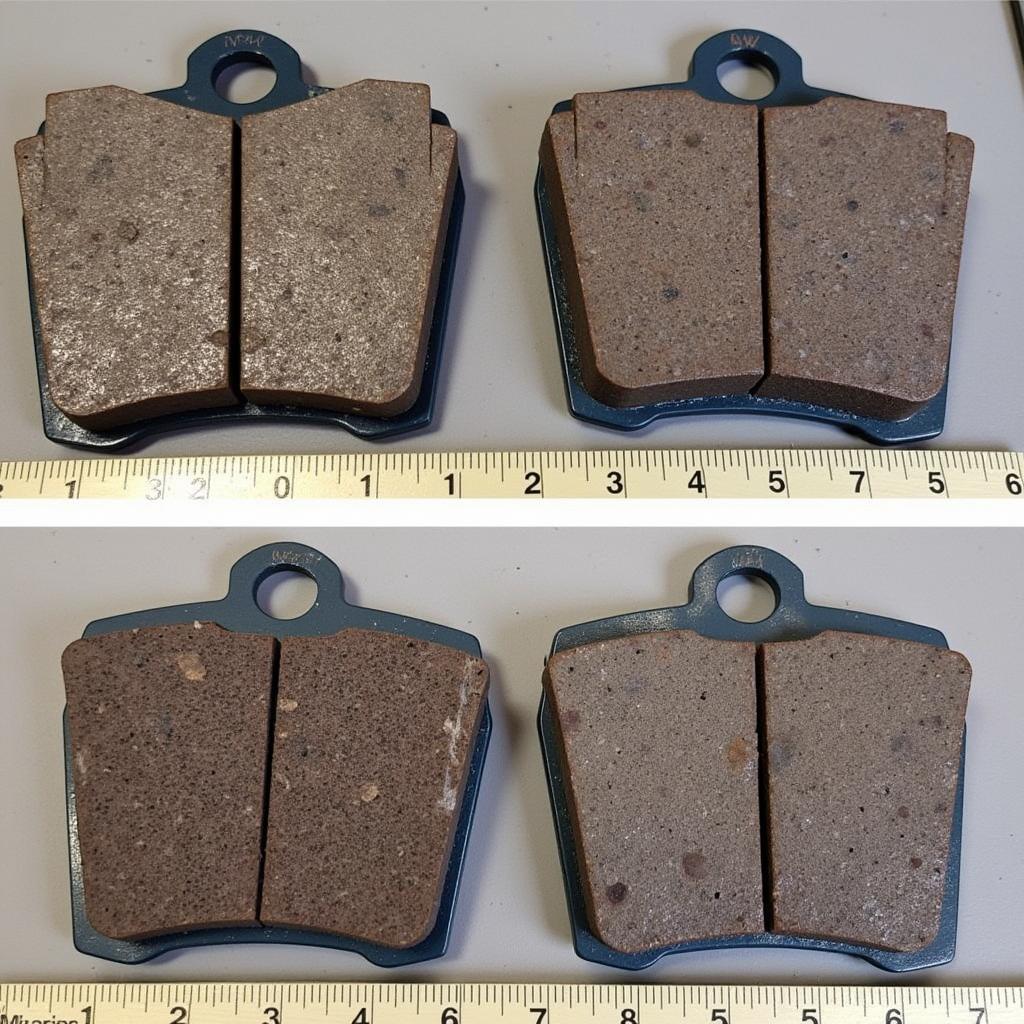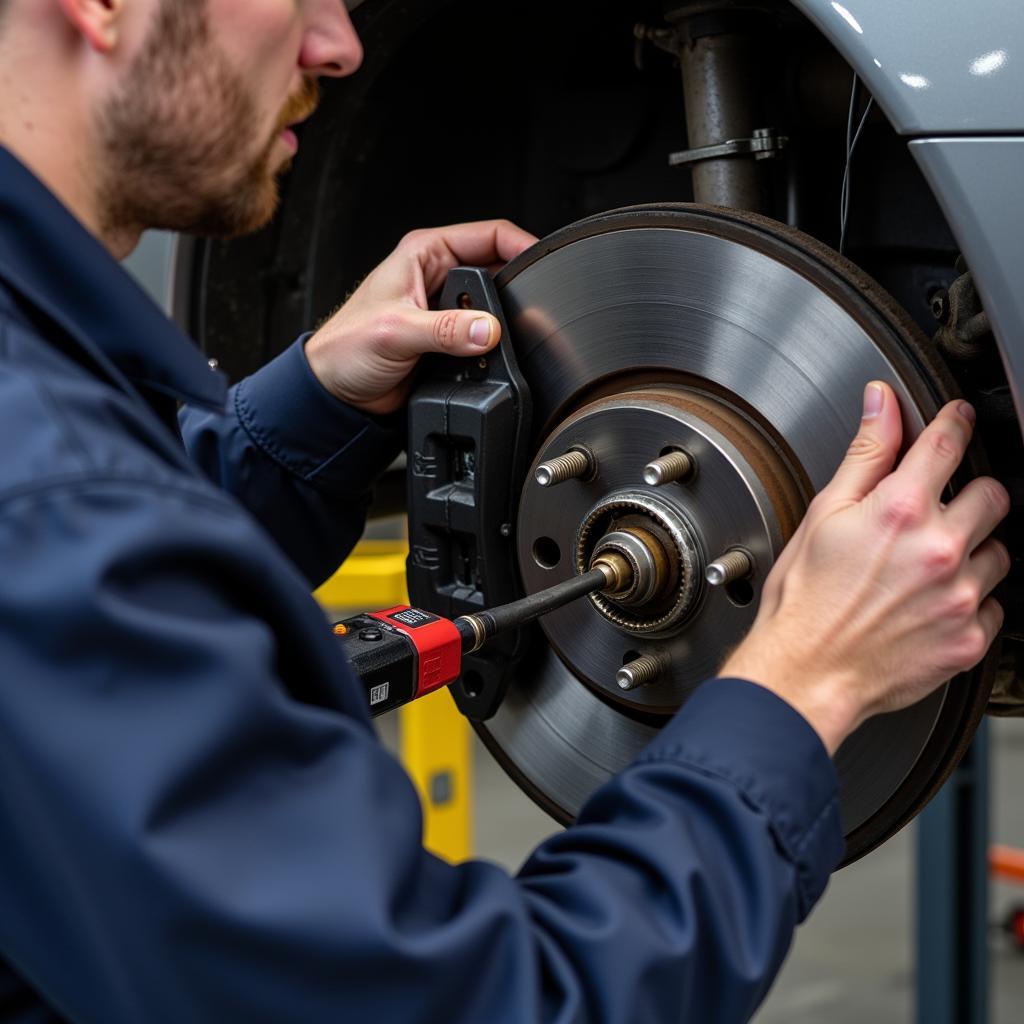Few things are scarier than hitting the brakes and realizing they aren’t responding as they should. If you’re driving a Volvo V50 and encounter a brake failure warning, your heart probably skips a beat. Don’t panic. This article is your guide to understanding and potentially resolving this issue, even remotely.
While I can’t physically fix your car from here, I can provide expert advice based on years of experience in remote automotive diagnostics, programming, and software installation. Let’s dive in.
Understanding Your Volvo V50’s Brake Warning System
Your Volvo V50 is equipped with a sophisticated system designed to alert you to potential brake issues. When the system detects an anomaly, a warning message, often accompanied by an audible chime or beep, will appear on your dashboard.
This message could indicate several issues, from low brake fluid to a malfunctioning sensor.
Common Causes of a Volvo V50 Brake Failure Warning
Several culprits could trigger the dreaded brake failure warning on your V50. Let’s explore some of the most common:
1. Low Brake Fluid
The lifeblood of your braking system, brake fluid, transmits the force from your foot on the pedal to the brake calipers, which squeeze the brake pads against the rotors to stop the car. If the fluid level drops too low, it could be a sign of a leak, and your braking performance will be compromised.
What to do:
- Check your brake fluid level: Locate the brake fluid reservoir under the hood. If the fluid level is low, carefully top it off with the correct brake fluid type specified in your owner’s manual.
- Inspect for leaks: Carefully examine the area around the brake fluid reservoir and the brake lines running to each wheel. A leak will appear as a wet spot, usually with a darker color than the surrounding area.
- Seek professional help: If you find a leak or the fluid level remains low after topping it off, it’s crucial to have a professional mechanic inspect and repair the leak.
2. Worn Brake Pads
Brake pads are designed to wear down over time. As you apply the brakes, friction between the pads and rotors generates the stopping power. Thin brake pads mean less friction material, leading to reduced braking performance and potentially triggering the brake failure warning.
What to do:
- Inspect your brake pads: You can visually inspect the brake pads through the spaces between the wheel spokes. If the pad thickness is less than ¼ inch, it’s time for a replacement.
- Listen for noises: Worn brake pads often produce a high-pitched squealing sound when the brakes are applied.
- Visit a mechanic: Replacing brake pads requires specific tools and know-how. It’s recommended to have this done by a professional mechanic to ensure proper installation.
 Worn Brake Pads on a Volvo V50
Worn Brake Pads on a Volvo V50
3. Faulty ABS Sensor
The Anti-lock Braking System (ABS) is a crucial safety feature that prevents your wheels from locking up during hard braking, helping you maintain steering control. A malfunctioning ABS sensor can disrupt this system, triggering the brake failure warning.
What to do:
- Check for other warning lights: A faulty ABS sensor might also illuminate the ABS warning light on your dashboard.
- Retrieve diagnostic codes: An OBD-II scanner can read diagnostic trouble codes stored in your car’s computer. These codes can pinpoint the problematic sensor.
- Consult a professional: Diagnosing and replacing an ABS sensor can be complex. It’s best to consult a qualified mechanic or dealership for this repair.
4. Brake System Electrical Issues
Modern cars, including your Volvo V50, rely heavily on electronics for proper brake function. Issues with wiring, connectors, or the electronic control unit (ECU) can disrupt communication within the braking system, leading to a warning.
What to do:
- Check for loose connections: Carefully inspect the wiring and connectors around the brake master cylinder, ABS module, and individual wheel speed sensors.
- Look for signs of damage: Corrosion, fraying, or damage to the wiring can cause electrical faults.
- Seek professional diagnosis: Electrical issues can be challenging to pinpoint. A qualified mechanic with the right diagnostic equipment can trace and repair the problem effectively.
“Remote diagnostics can be incredibly helpful in identifying the root cause of a brake failure warning,” says Anna Larsson, a seasoned automotive engineer specializing in Volvo vehicles. “By analyzing the data from the car’s computer, we can often determine whether the issue is related to low fluid, worn components, a faulty sensor, or an electrical problem. This remote diagnosis allows us to guide the car owner on the next best steps, potentially saving them time and money.”
What to Do When You See the Brake Failure Warning
Seeing a warning message related to your brakes can be unsettling, but it’s essential to remain calm and take immediate action:
- Reduce speed gradually.
- Pull over safely. Find a safe location away from traffic.
- Turn off the engine.
- Assess the situation. Is there visible fluid leaking? Can you hear unusual noises?
- Check your owner’s manual. Your manual will have specific instructions for brake-related warnings.
- Call for help. If you suspect a serious issue, do not attempt to drive. Call a tow truck and have your car transported to a trusted mechanic or dealership.
Preventing Brake Failure: Proactive Maintenance Tips
Regular maintenance is your best defense against unexpected brake issues. Following these tips can help keep your Volvo V50’s braking system in top shape:
- Regular brake fluid flushes: Consult your owner’s manual for the recommended brake fluid flush interval.
- Timely brake pad and rotor replacement: Don’t wait for the warning lights. Replace worn brake components at the first sign of trouble.
- Annual brake system inspections: A comprehensive inspection by a qualified mechanic can catch potential problems early on.
 Volvo V50 Brake Inspection
Volvo V50 Brake Inspection
Conclusion
While a brake failure warning on your Volvo V50 can be alarming, understanding its potential causes and taking appropriate action can help ensure your safety. Remember, regular maintenance, prompt attention to warning signs, and professional help when needed are key to keeping your Volvo V50’s braking system in optimal condition.
By following the information in this guide, you can confidently navigate the challenges of a brake failure warning and ensure safe and enjoyable driving experiences for miles to come.
